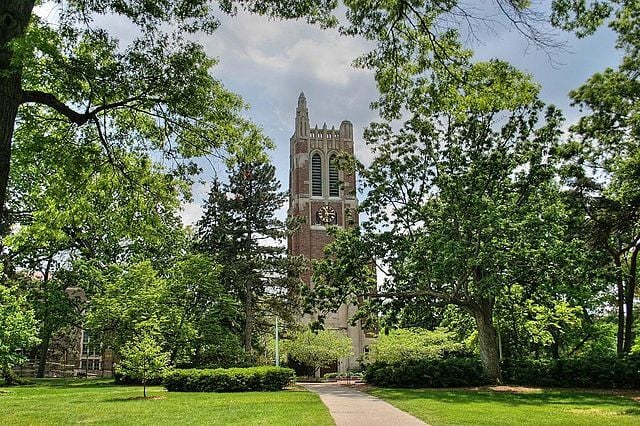
Michigan State University by Jeffness via Wikimedia Commons
Public colleges and universities sometimes get a bad rap.
For some reason, many people think state schools are not as rigorous or prestigious as fancy private colleges and universities. However, public colleges and universities offer many great advantages that may not be available at private institutions. State schools are not for everyone, but for some, they are a great fit!
Here are ten reasons to consider attending a public college or university:
1. Less expensive
Attending a public institution may be less expensive than attending a private institution. Public colleges and universities typically offer low tuition rates for in-state residents. Even out-of-state students might qualify for lower tuition rates if they apply through an academic common market such as WICHE.
(Editor’s note: While public colleges can be cheaper than privates, don’t look at “sticker” price to judge the cost. It’s a myth that ALL private schools are incredibly expensive.)
2. Large student populations
While some public universities are on the small size, a large percentage of the public universities are considered large. Large populations can be great for both outgoing and shy students.
For outgoing students, there are many ways to get involved with the many opportunities and personalities available on campus. For the shy student, they can sit back and wait until they are comfortable to connect with others on campus.
3. Diverse student populations
Diversity is good for students because it expands worldliness, enhances social development, and prepares students for future career success. Many of the public institutions offer diverse student populations in regards to race, gender, religion, and socioeconomic status. This allows students to learn from the different perspectives their fellow classmates and professors bring to the table.
4. A large list of academic programs
Large public universities generally offer a wide variety of academic programs.
This is great for students who are not sure what they want to study. It is also an advantage for all of the students who will change their mind about their major while in school. At a college with so many academic programs, students are bound to find an area of study they are interested in and enjoy.
5. Reputation
Sometimes state schools get pegged as just being “safety” schools or not as rigorous as other institutions. However, some of the highest-regarded colleges in the country are public institutions, such as UC Berkeley, UCLA, and the University of Virginia. Many of the public colleges also have highly regarded programs within the universities, such as the University of Michigan at Ann Arbor’s Business programs and the University of Texas at Austin’s Engineering programs.
6. Student activities
With a large student population comes a large student activities list. Smaller colleges usually offer less than 50 student organizations. However, large public universities can easily have hundreds of established student organizations, ranging from general interests to very specific focuses. Most students at public institutions will not need to spend the time starting their own organizations because they will be able to find anything they are looking for at a public university.
7. Active athletic programs
If you enjoy sports, many of the public universities have very active athletic programs. Spectators will have the opportunity to attend sporting events on campus and be part of fun college rivalries.
8. Student resources
Smaller colleges sometimes cannot offer a wide array of resources public institutions offer. Large public institutions have great resources such as tutoring services for every subject imaginable, huge fitness centers, and counseling services. All of these resources are usually included in the student fees student already pay or are offered at a minimal fee.
9. Amazing networking opportunities
Large student populations allow students to meet many other students. Student organizations bring industry leaders to campus to speak to the community. Professors invite colleagues to campus to speak to classes. If students put themselves out there, they will have the opportunity to meet and network with many individuals during their time on campus.
10. Job opportunities
In their area, many public institutions have name recognition and are nationally known.
Numerous companies come to campus seeking future interns and employees for their companies or organizations. Students can meet these employers on campus at career fairs, in career centers, or even through introductions from their professors.
Of course, none of these characteristics are exclusive to public colleges and universities, necessarily. Nor are they descriptive of every single public college in the country. But, in general, you can expect to find most or all of these to be true if you choose to attend a public institution.
There are many reasons to consider this type of institution–and there are many reasons to consider other types as well!
Weigh your options carefully to determine which kind of institution will be the best fit and offer you the most opportunity to succeed.







I love what you said about networking. It’s true that when you go to college you get to know and meet a lot of people. You have no idea where they will all end up. When I go to college again I’ll be sure to make as many friends as possible.
My daughter is a high school senior, and she doesn’t know which college she should go to. I like that you talked about how large universities have a lot of student organizations and activities for students to get involved in. My daughter loves service groups, so maybe she should narrow down her choice to a large college that might have organizations for her to join.